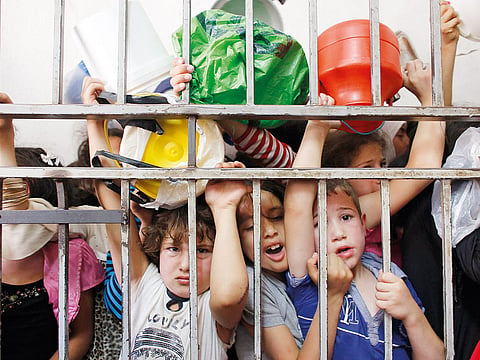US cuts leave Palestinian refugees in crisis
Fears of emergency are growing, with UN officials accusing US of using aid as weapon

In November 1948, Khadija Hijjo and her family fled Israeli occupation forces advancing on the village of Al Jura, close to what is now the Israeli city of Ashkelon.
“We had land, we grew grapes and strawberries and dates, and we used to sell them in Jaffa,” she says. “Then, when we came to Gaza, we slept on the ground ... you had all your furniture, and you left without anything.”
The sprightly 89-year-old widow, whose infectious smile confounds her history, is sitting straight-backed on a plastic chair as she awaits her quarterly UN Relief and Works Agency (UNRWA) food ration at Gaza City’s Beach refugee camp .
Hijjo, who lives alone, rattled off its contents with the precision of the prudent woman she has been for more than 70 years: one bag of flour, half a kilo of lentils, one kilo apiece of sugar and chickpeas, two bottles of cooking oil and five cans of sardines.
But now Hijjo’s food rations are at the sharp end of US President Donald Trump’s controversial plans to reshape the Middle East. Until 2017, the US donated roughly one-third of UNRWA’s $1.1 billion (Dh4.04 billion) budget — easily the biggest contribution — to cover schooling, health care and food aid for 5.3 million Palestinian refugees in Jordan, Syria, Lebanon, the West Bank and Gaza.
‘Yemen-style crisis’
But the US has decided to end funding, in what Matthias Schmale, UNRWA’s Gaza director, called an unprecedented politicisation of aid which risks a “Yemen-style crisis”.
Emergency donations made by Britain and other countries to make up the shortfall left by the US decision means schools and health clinics will stay open until this summer. But there are no guarantees that food aid, on which 77 per cent of Gaza’s 1.3 million registered refugees below the international poverty line depend, can be sustained beyond January, says Schmale.
The warning comes with Gaza’s economy in “freefall”, according to the World Bank, with unemployment at 54 per cent overall and more than 70 per cent for those under 25. Najah Haddad, 60, another Beach camp registered refugee, describes Trump’s aid cut as “haram” (which means forbidden), adding: “We need more food not less!” Asked if her husband or stepson was working, she caustically replied: “Is there work in Gaza?”
Ending food aid would reduce most refugees to the level of the poorest non-refugees who do not receive UN food aid, like Mohammad Abu Beid, 22.
He rises at 6am with his brothers to clamber through Gaza City’s rubbish skips searching for recyclable plastic, for which he is paid five shekels (Dh4.86) a kilo, and aluminium cans, for 70 of which he gets about Dh1. He used to sell cigarette lighters at road junctions, but can no longer afford the wholesale price.
Schmale says that, in an ideal world, there would be advantages in not being as dependent on a single donor as UNRWA had been on the US. But the cuts came at a time when overall aid to Palestinians was already approaching an all-time low.
This is partly down to other crises, like those in Yemen, the Central African Republic and Syria, competing for limited resources. But it is also, says Schmale, because “some donors will say: ‘When the crisis is not caused by a tsunami or earthquake or something but by politics, we’re fed up with putting valuable resources we could be using to address hunger and floods and so on, into a highly politicised environment’.”
Resilience eroding
He says he is repeatedly seeking to impress on donors the need for “preventative” humanitarian aid for refugees in Gaza.
“If I was a donor, I would say: ‘Is Gaza as dramatic as Yemen?’ The objective answer is no. [But] if we stop food for half the population this place will collapse and could descend into a Yemen-like crisis.”
Schmale says the resilience of Gazans after 11 years of blockade and three wars is “eroding”, as shown by growing suicide rates and the participation of thousands of young people in twice-weekly border protests despite 22,000 injuries, nearly a quarter of which are “lifelong”.
This shows “a level of desperation that wasn’t there two or three years ago”, says Schmale.
While a previous $446 million deficit has now been cut to $21 million, Schmale has been forced to cut over 100 jobs and make more than 500 staff part-time in response to the funding crisis.
Twenty international staff were briefly evacuated in October after angry UNRWA trade union members swarmed around a vehicle in which they were travelling. Hamas police did not intervene in the incident.
When the job cuts were announced in July, Schmale, who has his own close protection officers, was provided with a Hamas escort in Gaza after employees occupied his office. Talks between the UNRWA director and the union have since averted the threat of an all-out strike.
(c) Guardian News & Media Ltd, 2018



